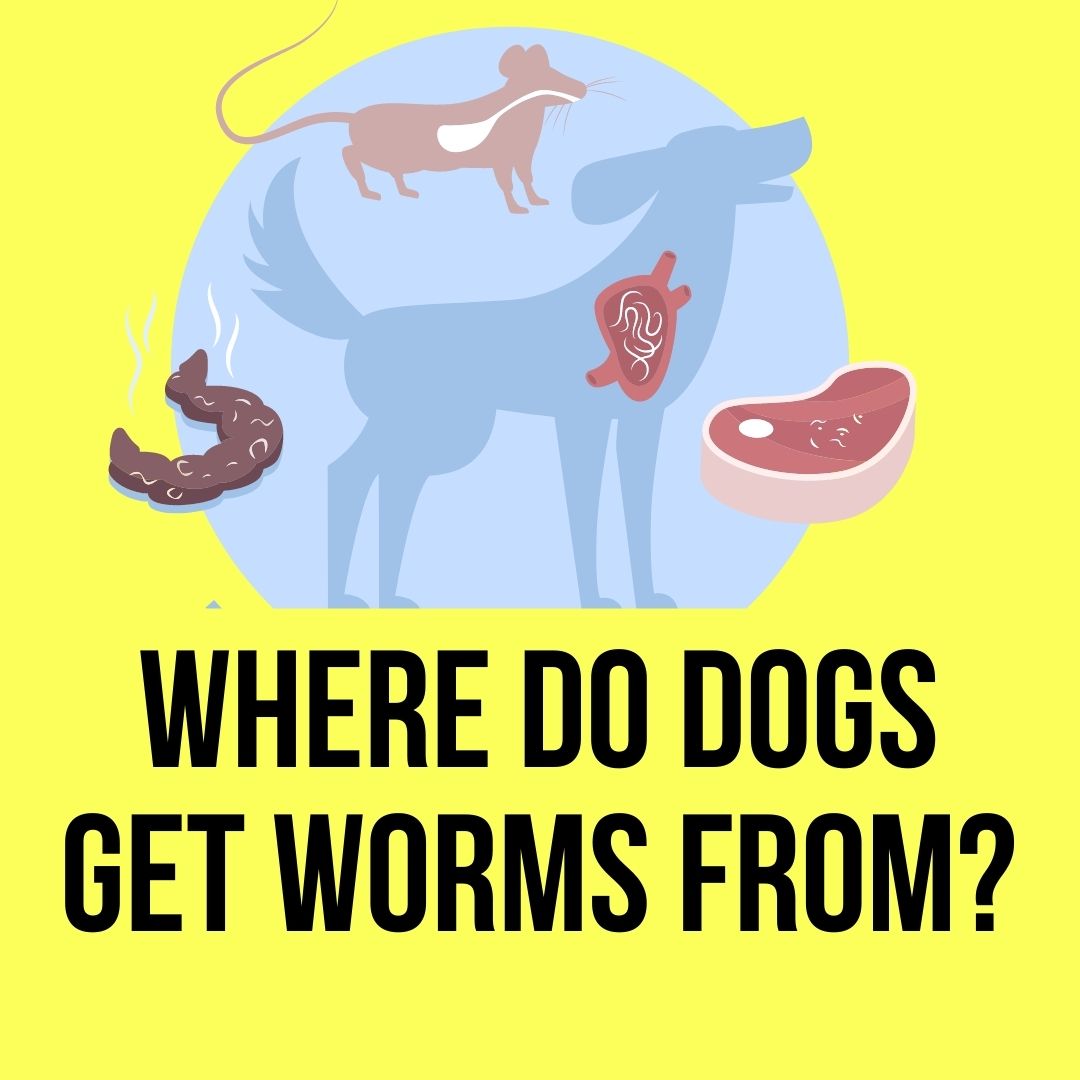Wondering Where does your Dog Get Worms from? Even Though You do all the precautionary measures! The idea of worms in dogs is always very unpleasant. Worms are parasites that can infect a dog’s digestive system and overall health.
Of course, no dog owner wishes to learn that disgusting worms or creepy crawlies are infesting their pet’s health from the inside.
But overlooking the fact or running away from the problem isn’t ever a solution.
It is very common for dogs to get worms. Someone who has kept dogs as pets might know the struggle of often facing the worm challenge.
It may show up as bad digestive health, lethargy, or other changes in your dog’s body.
No matter how gross they sound, intestinal worms are pretty common in dogs. However, they aren’t unavoidable.
Contents
5 Common types of worms in dogs
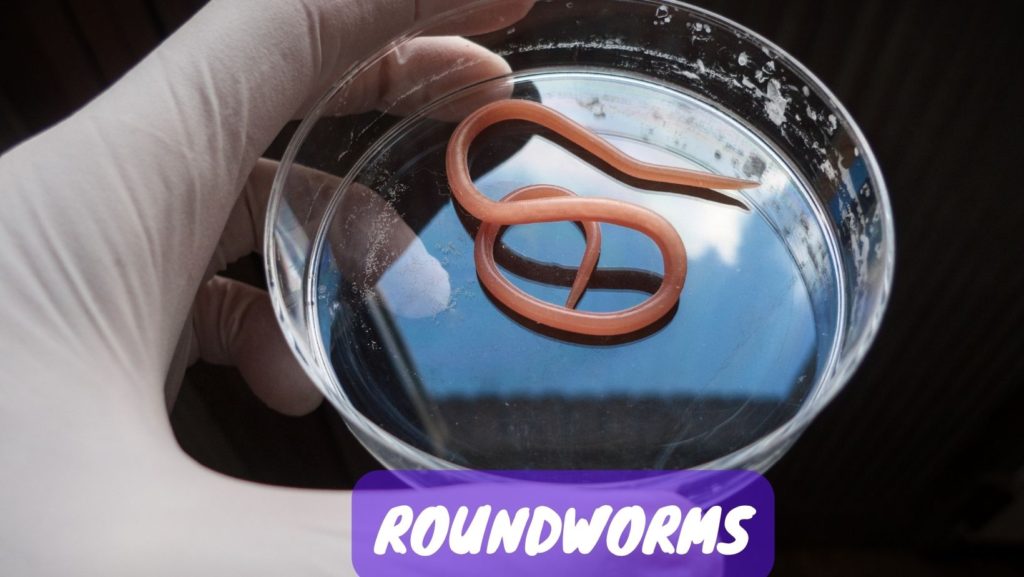
Roundworms (Toxocara Canis, Toxascaris leonine):
They are the most common intestinal parasites your dog can have.
They are especially common in puppies and appear after contracting from the mother’s uterus during gestation.
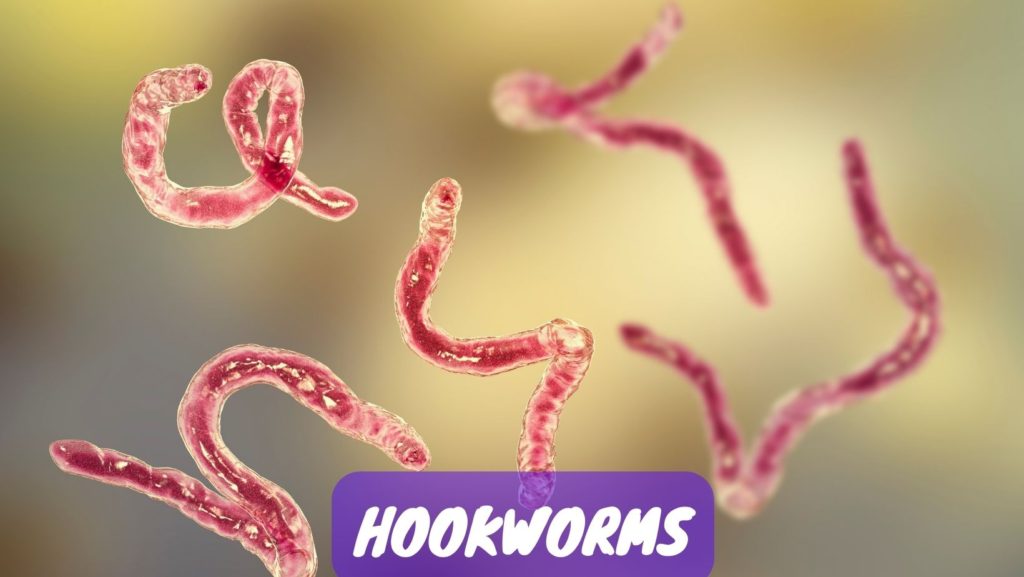
Hookworms (Ancylostoma caninum, Ancylostomabraziliense):
They are smaller than Roundworm.
Hookworms usually infect the dog’s body leading to anemia most commonly.

Tapeworms (Dipylidium caninum):
They are another type of intestinal parasite that appear long and flat.
Though fortunately, these parasites don’t usually harm dogs but are more of a hygiene concern only.
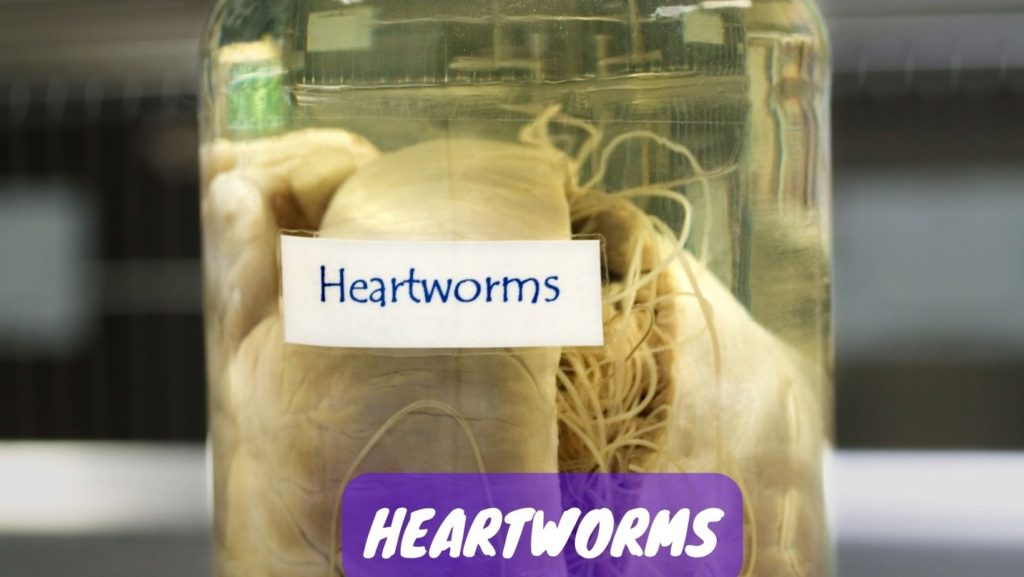
Heartworm (Dirofilaria immitis):
heartworm known as dog heartworm is a parasitic filarial roundworm.
This worm has a thread-like structure that spreads between hosts via mosquito bites and causes dirofilariasis.
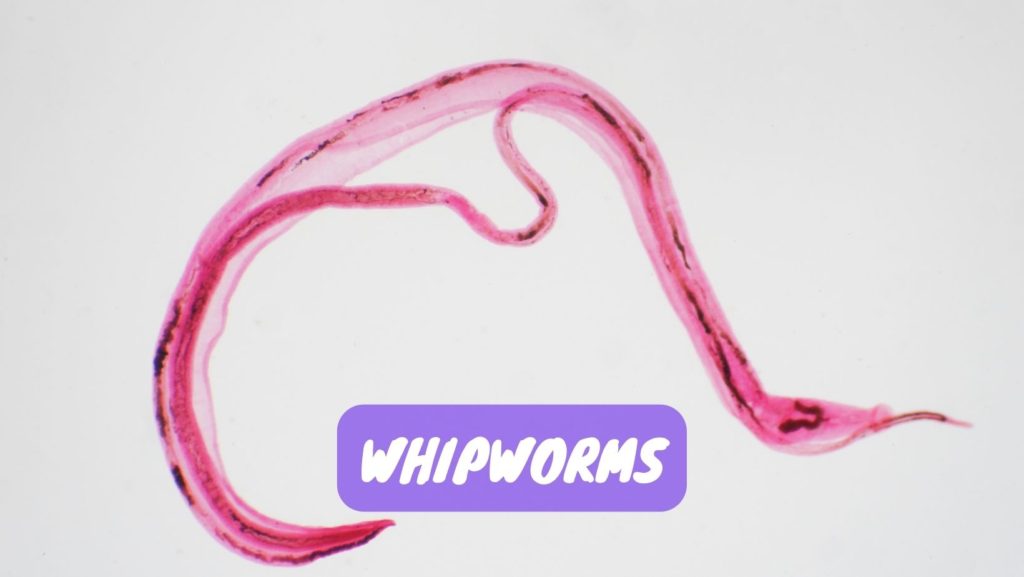
Whipworms (Trichuris vulpis):
They live in the dog’s large intestine and are very small to be easily seen.
They don’t generally produce any harm, but in some cases, their presence may lead to diarrhea and anemia.
How do most dogs get worms?
How do dogs randomly get worms? It is very easy and common for dogs to catch intestinal parasites, in short, Worms.
Dogs are animals and thus a little less responsible for what to eat and from where to eat.
And that is what ‘Eating Habits’ make dogs more prone to getting worms and other intestinal parasites.
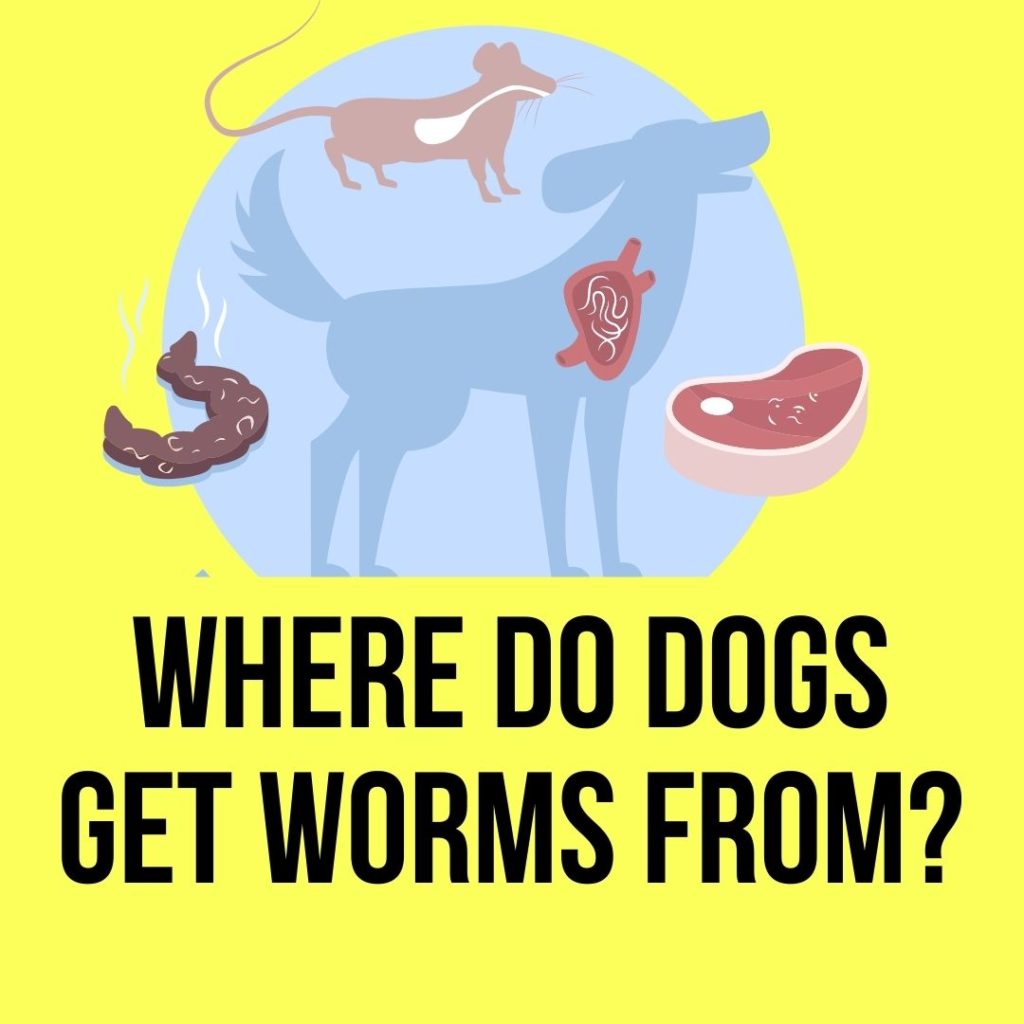
10+ Places Dogs Get Worms
If you ever notice your dog eating from trass, stop him right away.
While going out on a park date with your dog, always be cautious about what your dog is eating and sniffing.
There are a lot of alien objects in the outdoors that makes dogs catch worms.
Here are some of the most common places your dogs can get worms from:
- Contaminated food
- Contaminated water
- Worm larvae
- Contaminated or rotten meat
- Contaminated Soil
- Infected animals or self-infection
- Infected stool/ poop
- Fleas Bite
- From mother dog.
- During birth.
5 Ways Your Dog Can pick up Intestinal Worms
- From eating worm eggs
Worms’ eggs can live in the external environment for several years. You can find them in soil, grass, between rotten leaves, fruits, and almost any thriving space.
And since they can survive commonly in any of these areas/ objects, it is quite easy for your dog to pick them up. As a result, your dog can accidentally eat worm eggs, leading to a parasite infection.
- From fleas or during grooming
Swallowing fleas during grooming is common for developing worm infections in dogs. Fleas are known for carrying tapeworm or roundworm larvae. And when your dog swallows them, it slowly develops into adult worms inside the intestine.
- From mosquitoes
Besides Flea, dogs can also develop worms via mosquito bites. Usually, a mosquito bite passes heartworms inside the dog’s body.
They can further lead to fatigue after exercise, fainting spells, a persistent cough, less appetite, and weight loss. In some rare cases, it may also lead to death.
- From mother to puppy
A pregnant bitch can transfer roundworm infection to her unborn pup in the womb itself.
The transmission happens via the placenta and is quite common. A mother dog can also transfer worm infection to its pup while breastfeeding.
- Due to their Hunting behavior
If you live in an area where your dog can easily get out and hunt, worm infection chances become more common.
When dogs hunt on infested animals and birds, chances of getting the same infection grow vital.
Can Dogs Get Worms from People’s Food?
It is not very likely, but dogs can get worms from people’s (human) food. Consuming table scrapes and contaminated human food can develop worms in a dog’s intestine.
Besides food, a contaminated environment too is one of the major culprits for worms in dogs.
An untidy home that becomes capable of developing parasites can infect both dogs and humans within no time.
However, dogs are more like get worms from animal/ human feces, wild Roten prey, and insect bites.
Where do dogs get worms in their poop?
Dogs get worms in their poop after feeding on something bad and rotten. Canines usually have a habit of eating from trash, roadside, and open poop.
This eating habit further on generates worm and intestinal parasites inside their digestive tract. And these worms/ parasites later pass out through the dog’s poop/ stool.
The best way of identifying worms in dogs’ poop is via stool test. Pet owners suspecting the same can take a sample of their dog’s poop to the Vet.
The responsible diagnosing individual will dissolve the stool sample into a special solution and spin it in a centrifuge. Later he will examine it under a microscope to determine the worm.
How can I prevent my dog from getting worms?
Dogs love exploring the external environment with their mouth, which later becomes a common reason for infection development.
However, there are multiple ways you can prevent your dog from getting worms and other parasitical infections.
Tips that will help you in preventing worms in dogs.
Begin with using the prevention methods. Multiple monthly parasite control products help against common worm infections. These products are easily available at the Vet and are totally safe for dogs. They are available in the form of chewable and topical spot treatments.
Always keep your dog away from contamination, preferably in a safe environment. Prevention, as we insist, is the key to avoiding any mishappening. For example, always keep your dog from eating or drinking from the trash. While visiting a public park, keep the canine away from feces, poop, garbage, and possibly from eating anything randomly.
Additional TIP: Pick your pet’s poop from the park as soon as they release it. This way, you will manage to keep other dogs from catching any kind of infection.
- Consider keeping your dog’s paw, tail, and hair clean. It is one of the major but often overlooked reasons why your dog is getting worms.
- Use deworming after frequent intervals. As per experts, deworming a dog once every 3 to 4 months helps in maintaining the canine’s health.
- Feed Pumpkin seeds to your dog often (if suits). These seeds aren’t just human superfoods but an extremely effective deworming agent for dogs as well. Pumpkin seeds paralyze the worms making elimination easier. Feed one teaspoon of raw or lightly roasted pumpkin seeds per 10lbs of dog’s body weight daily. Avoid the one with salt and seasoning.
- Carrot (a rich source of Vitamin A) and Coconut also help in getting rid of worms in dogs. Besides doing this particular job, these food items offer several other health benefits as well.
Wrapping up…
Worms and parasites in dogs might scare you, but brace yourself since they are curable. Instead of avoiding or freaking out, always reach the Vet for expert help.
Besides that, it is crucial to ensure that your dog is dewormed every now and then. Even when your canine maintains a very hygienic lifestyle, deworming is still a must.
- You May Also Like To Read
- Can Dogs Get Worms from Cats?
- How Long Does It Take For Worms To Leave A Dog?
- Can I Get Worms From My Dog Sleeping In My Bed?
